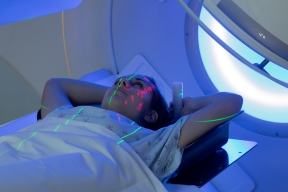Radiation Therapy for Breast Cancer – Q&A
Medically Reviewed by Virginia L. Clyburn-Ipock, MD
Dr. Virginia Clyburn-Ipock, McLeod Radiation Oncologist, discusses radiation therapy for breast cancer.
Question: How is radiation therapy effective in the treatment of breast cancer?
Answer: Radiation therapy is used after a woman undergoes surgery, whether that is a lumpectomy or mastectomy (a lumpectomy where just the tumor is removed, and the breast remains intact versus a mastectomy which removes the entirety of the breast). Radiation is used to kill any microscopic cells that could be left behind, thus decreasing the risk of breast cancer recurrence throughout the woman’s life.
Q: What advancements have been made in radiation oncology to benefit the patient with breast cancer?
A: Traditionally, radiation was given Monday through Friday, five days a week for five to six weeks. This is how radiation was delivered for decades. In 2010, there were two studies that were published, one out of Canada and one out of the United Kingdom, which indicated that some women who are candidates could get their breast radiation in three to four weeks as opposed to five to six weeks. Naturally, that is more convenient for these patients having to go through breast radiation. Now there is new data emerging showing that we can actually get some patients treated in as little as five days. In addition, new data is coming out that is showing, instead of treating the entirety of the breast like we have traditionally done, we can actually zone in and do what is called partial breast irradiation targeting part of the breast, which naturally will reduce the risk of toxicities for the patient.
Q: If the cancer spreads to the brain is radiation treatment an option?
A: In regards to the brain, yes, radiation is the mainstay of treatment, and the reason is because the brain has what is called a blood brain barrier. So, if I go out and consume a lot of illegal substances, my brain has a barrier to protect it from not allowing all those substances to go up to my brain and lead to a permanent coma. In the same regard, many agents such as chemotherapies, biologics, and immunotherapies that are used when a woman has Stage IV breast cancer cannot easily penetrate to the brain. However, radiation can go straight through the brain. The blood brain barrier does not block radiation. So, radiation is a mainstay if a woman’s breast cancer has spread to the brain.
Q: How does a patient benefit from the McLeod Breast Tumor Board?
A: The McLeod Breast Tumor Board meets once a week for us to specifically discuss each breast cancer patient that is diagnosed at McLeod. During this tumor board, we have pathologists who make the diagnosis by looking at the biopsy specimen. We have radiologists who are trained specifically in women’s health. We also have radiation oncologists like myself who weigh in as well as medical oncologists who oversee chemotherapy and biologics for these patients. And we have our team of surgeons and supporting staff. Every patient who gets diagnosed at McLeod will have their case presented at this multidisciplinary tumor board, which meets once a week. We have a very robust discussion about each patient and what treatment is best for their cancer as an individual. We are smarter together and a multidisciplinary team looking at each individual case allows for the best care for that patient.
-
McLEOD REGIONAL MEDICAL CENTER FLORENCE
843-777-2000 -
McLEOD DARLINGTON
843-777-1100 -
McLEOD DILLON
843-774-4111 -
McLEOD LORIS
843-716-7000 -
McLEOD SEACOAST
843-390-8100 -
McLEOD CHERAW
843-537-7881 -
McLEOD CLARENDON
803-433-3000



-
McLEOD REGIONAL MEDICAL CENTER FLORENCE
843-777-2000 -
McLEOD DARLINGTON
843-777-1100 -
McLEOD DILLON
843-774-4111 -
McLEOD LORIS
843-716-7000 -
McLEOD SEACOAST
843-390-8100 -
McLEOD CHERAW
843-537-7881 -
McLEOD CLARENDON
803-433-3000
 Find a Doctor
Find a Doctor  Locations
Locations  Services
Services 